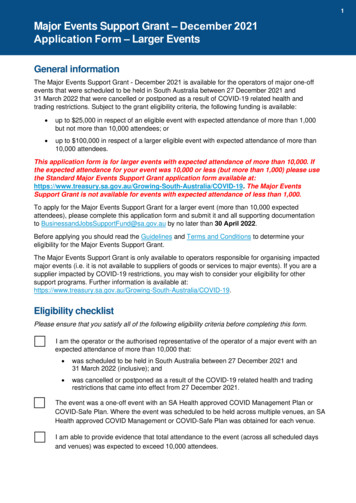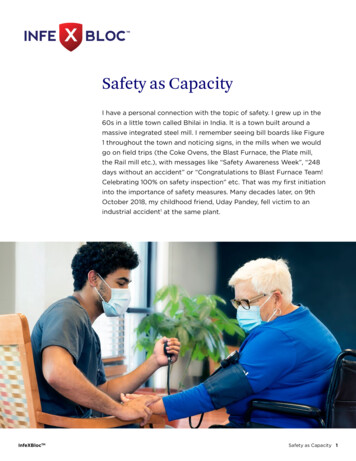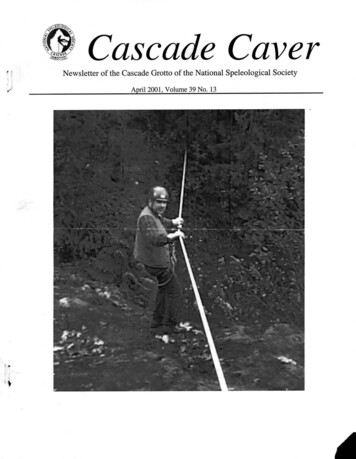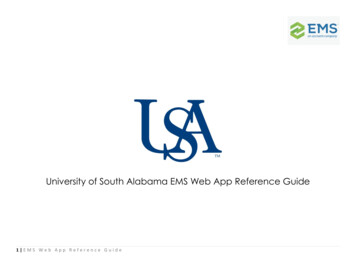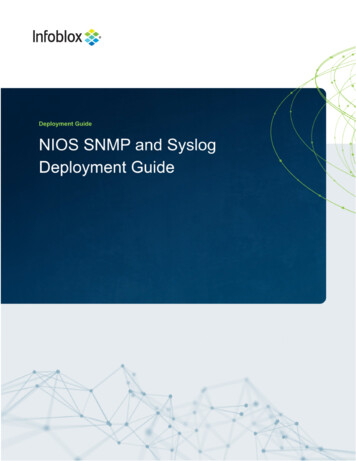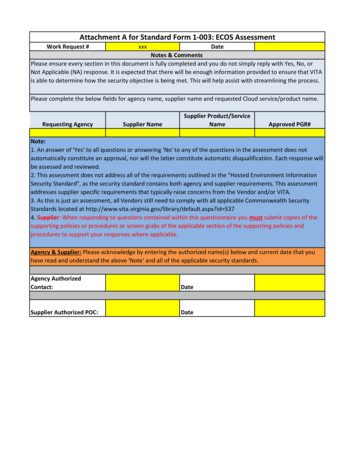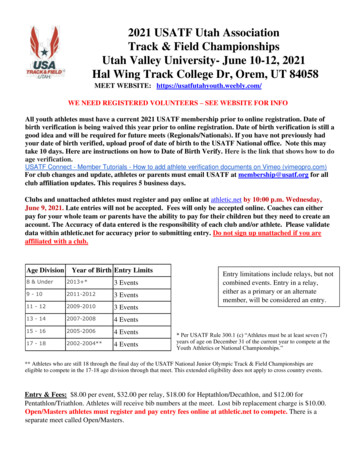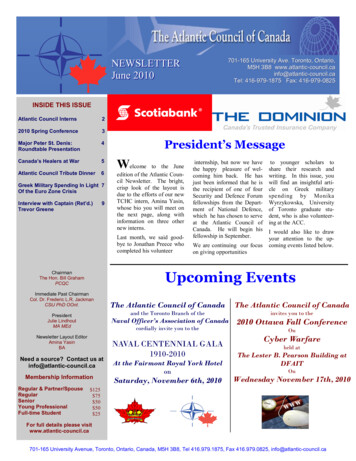
Transcription
701701-165 University Ave. Toronto, Ontario,M5H 3B8 fo@atlantic-council.caTel: 416416-979979-1875 Fax: 416416-979979-0825NEWSLETTERJune 2010INSIDE THIS ISSUEAtlantic Council Interns22010 Spring Conference3Major Peter St. Denis:Roundtable Presentation4Canada’s Healers at War5Atlantic Council Tribute Dinner6Greek Military Spending In Light 7Of the Euro Zone CrisisInterview with Captain (Ret’d.)Trevor Greene9President’s MessageWelcometo the Juneedition of the Atlantic Council Newsletter. The bright,crisp look of the layout isdue to the efforts of our newTCHC intern, Amina Yasin,whose bio you will meet onthe next page, along withinformation on three othernew interns.Last month, we said goodbye to Jonathan Preece whocompleted his volunteerChairmanThe Hon. Bill GrahamPCQCWe are continuing our focuson giving opportunitiesto younger scholars toshare their research andwriting. In this issue, youwill find an insightful article on Greek militaryspending by MonikaWyrzykowska, Universityof Toronto graduate student, who is also volunteering at the ACC.I would also like to drawyour attention to the upcoming events listed below.Upcoming EventsImmediate Past ChairmanCol. Dr. Frederic L.R. JackmanCStJ PhD OOnt.PresidentJulie LindhoutMA MEdThe Atlantic Council of CanadaThe Atlantic Council of Canadaand the Toronto Branch of theinvites you to theNaval Officer’s Association of Canadacordially invite you to theNewsletter Layout EditorAmina YasinBANeed a source? Contact us atinfo@atlantic-council.caMembership InformationRegular & Partner/SpouseRegularSeniorYoung ProfessionalFull-time Studentinternship, but now we havethe happy pleasure of welcoming him back. He hasjust been informed that he isthe recipient of one of fourSecurity and Defence Forumfellowships from the Department of National Defence,which he has chosen to serveat the Atlantic Council ofCanada. He will begin hisfellowship in September.NAVAL CENTENNIAL GALA1910-2010At the Fairmont Royal York HotelonSaturday, November 6th, 20102010 Ottawa Fall ConferenceOnCyber Warfareheld atThe Lester B. Pearson Building atDFAITOnWednesday November 17th, 2010 125 75 50 50 25For full details please visitwww.atlantic-council.ca701-165 University Avenue, Toronto, Ontario, Canada, M5H 3B8, Tel 416.979.1875, Fax 416.979.0825, info@atlantic-council.ca
June, 2010www.atlantic-council.caPage 2Atlantic Council Interns“NEW INTERNS”Kirsty Hong is currently completing her Master of Arts in Political Science at the Center for European,Russian, and Eurasian Studiesat the University ofToronto. She specializes in “Kirsty studied both Polish and Ukrainian”NATO relations,nuclear weapons proliferation, nuclear strategy, and ballistic missile defense. She travelled extensivelyaround Western and Eastern Europe, working and studying in Finland, Germany, and Poland, and studiedboth Polish and Ukrainian. Kirsty started her internship at the ACC in May and is excited to be a part of theleading think tank on transatlantic issues. She hopes to contribute positively to the ACC through publications and helping with conferences and events, as well as to gain more experience that will help her in herfuture ambitions with NATO. She can be reached at kirsty.hong@utoronto.ca.Amina Yasin graduated from the University of Guelph with an Honours Bachelor of Arts degree inCriminal Justice and Public Policy, with a focus on Public Policy, Administration, Governance andLaw. She will be pursuing her MSc in International and Capacity Development with a focused interestin public policy and development issues this fall. Amina has quite a few years of diverse professionalpublic sector, NGO, international development work and volunteer experiences. Over the past coupleof years she has been able to work with local and international development agencies such as Solidarites a French emergency humanitarian aid agency in Nairobi, Kenya. She also participated as aproject lead for Project Serve Canada – Mississippi 2009 as well as a Canadian Delegate at the 4thWorld Youth Congress in Quebec City 2008. Amina has also worked as a civil servant within thepublic sector at the Government of Alberta and has most recently worked“Amina has quite a few years of diversewith the University of Guelph Human Rights and Equity Office as a HumanRights Resource Person and Fact Finder over the last year. She is fluent inprofessional public sector, internationalEnglish, Swahili, and can understand Somali. Through her internship withdevelopment, and NGO work experiences.”the Atlantic Council, Amina looks forward to learning about transatlanticissues and better understanding the role of NATO in international affairs particularly as it relates to the role that international institutions such as NATO and national institutions such as the ACC play in supporting the rights of marginalized communities on the national level and internationally. She can be reached at amina.yasin@atlantic-council.ca“Nino has extensive experience working as Nino Marshania graduated from the Unia TV reporter and freelance journalist.” versity of Montreal with a Masters in science ofcommunication, specializing in media and organizational communication. Nino holds a Bachelors degree in International Journalism from TbilisiState University. Along with working with International Organizations such as the Red Cross, Ninohas been actively involved in volunteering for Free the Children, Rotary Foundation, and SalvationArmy. As Rotary Ambassadorial scholar she was dedicated to promoting cultural diversity and understanding. Nino has extensive experience working as a TV reporter and freelance journalist. Currently she is pursuing her studies in Communication and Culture at York and Ryerson Universities,specializing in cultural studies and politics and policy. Nino is also a coordinator for Eco-Art MediaFestival at York University. She speaks fluent French, English, Russian, Lithuanian, Georgian and basic Spanish. As an intern withthe ACC Nino hopes to enrich her knowledge of NATO and Canada’s involvement, as well as acquire experience working with aCanadian NGO. She can be reached at ninomars@yorku.caMonika Wyrzykowska is currently completing her Master’s Degree at the Centre for European, Russian, and Eurasian Studies at the University of Toronto, with a specialization in Political Science and History. She also earned“Monika is a former Director of Communications for the her Bachelor ofArts degree at theuniversity, withnational board of the Canadian Polish Congress.”a double major inEconomics andEuropean Studies.Herresearchinterests include the enlargement of the eurozone into Poland and the potential new member states, as wellas the political implications of the current debt crisis. Monika is also very active in the Polish-Canadiancommunity. Currently serving as President of the Polish Students’ Association at U of T, she is a formerDirector of Communications for the national board of the Canadian Polish Congress and an alumnus of the First School for Leadersof the North American Polish Community in Warsaw sponsored by the Polish Senate. Wishing to expand her knowledge of transatlantic issues and Canadian policy interests, Monika is looking forward to utilizing her knowledge of Polish, German, and French,organization skill, as well as her research experience to make a significant contribution at the Atlantic Council of Canada during herinternship. She can be reached at monika.wyrzykowska@utoronto.ca701-165 University Avenue, Toronto, Ontario, Canada, M5H 3B8, Tel 416.979.1875, Fax 416.979.0825, info@atlantic-council.ca www.atlantic-council.ca
June, 2010May,2010PagePage 33www.atlantic-council.caAtlantic Council 2010Spring ConferenceMINIMIZING CONFLICT IN THE RACE FORNATURAL RESOURCES: SECURINGECONOMIC STABILITY IN THE 21stCENTURYWritten by Tanah SullivanAbove: Mohammed Yahya, Manager, UN Interagency FrameworkTeam for Resource Management and Preventative Action, New York.;Dr. Maureen S. Crandall, Professor of Economics,National Defence University, Washington, D.C.Below:Dr. James Boutilier, Special (Policy) Advisor, Commander,maritime Forces Pacific, C.F.; Below Right: Peter Gibson, Manager,Director, Strategy and Quantitative Research, CIBCAbove Right:Col.Dwayne Hobbs; EdBadovinac, BernardR. Wilson. AboveLeft: Paul Davis,Andy Mahut, &Col. Andrew Budd,Below Left: Mohammed Yahya,Manager, UN, NewYork. & Ed Badovinac. BelowRight: Col.McKenna & Col.Brian MacDonald.Right: RearAdmiral Maddison.The Atlantic Council’s annual Spring Conference washeld on April 8, 2010 at Trinity College, at the Universityof Toronto. This year’s topic was ‘Minimizing Conflict inthe Race for Natural Resources: Securing Economic Stability in the 21st Century’, looking at different issuespertaining to resource security from of influence or as economicgeopolitical, economic and military levers in international politics,standpoints. Conference attendees were and the need to reform the outoffered an in-depth look at many differ- dated international organizaent aspects of resource scarcity from an tions of today.impressive list of speakers from a wideThe second session offered arange of industries and professional closer look at energy for thebackgrounds. The speakers provided next decade, looking at thethorough, informed and detailed discus- impact of energy security onsions that sparked debate and dialoguethe private sectoron how resourceand from within“Thorough, informed andsecurity will imeconomicdetailed discussions sparked thepact both thespectrum. Thedebate and dialogue on how panelists werepublic andprivatesectorsNATO will define its role in Dr. Maureen S.and how NATO dealing with the increasingly Crandall, Profeswill define itscomplex securitysor of Economrole in dealingics from the Naissue.”with thetional Defenceincreasingly complex security issue.University, Washington D.C.,The conference was divided intothree sessions, following a welcomeaddress and introduction from the Hon.Bill Graham, Chairman of The AtlanticCouncil of Canada. The first sessionidentified global resource needs andsecurity issues, with panelistMohamed Yahya, manager of theUnited Nations Interagency FrameworkTeam for Resource Management Preventive Action, presenting his view onthe UN’s response to the challengesfaced by resource-rich developingcountries and its cooperation with otheragencies such as the EU in dealing withresource-based conflict. Colonel Andrew Budd, Branch Chief of the Strategic Policy and Concepts Branch at theNATO Headquarters, offered a militaryperspective to the issue, focusing on thethreat of future conflict and the securitychallenges arising from resource scarcity and climate change. He discussedthe threats posed by those with richresources, using oil and gas as weaponsMr. Peter Gibson, ManagingDirector of Portfolio Strategyand Quantitative Research atCIBC and Dr. James A. Boutilier, Special Advisor and Commander of the Maritime ForcesPacific.The third session, looking atthe importance of minerals,included Mr. Harry Skinner,Senior Researcher of the G8/G20 Group at the University ofToronto, Mr. Ian London, Market Development and EnergyAdvisor of Avalon Rare Metalsand Mr. Bernard R. Wilson,Lead Director of ConsolidatedThompson Iron Mines Limited.701-165 University Avenue, Toronto, Ontario, Canada, M5H 3B8, Tel 416.979.1875, Fax 416.979.0825, info@atlantic-council.ca www.atlantic-council.ca
June, 2010www.atlantic-council.caPage 4The Atlantic Council had the privilege of welcoming Rear-Admiral PaulA. Maddison, Commander of the Maritime Forces Atlantic, who delivered ahighly-informative keynote address onthe new challenges faced by Canada’sNavy.The Spring Conference ended on amuch more informal note, as attendeesand participants mingled and continueddiscussions over cheese platters andwine at the conference reception. Everyone was also given the much-anticipatedopportunity to meet and talk with thespeakers, other Atlantic Council members and colleagues and Rear-AdmiralMaddison. The reception, brought together people from varying backgroundsand professions to fulfill The AtlanticCouncil’s aim of promoting awarenessand dialogue amongst the Canadian public on global security issues. Overall, itwas not only an educational and informative event, but also one that provideda valuable opportunity to discuss one ofthe world’s most pressing security concerns with highly-qualified and knowledgeable specialists and experts.Above: Maj. Peter St. Denis patrols the Panjway District, Afghanistan on Jan. 21, 2009.police schools, including the FBI Academy predominantly a liaison between the militaryin Virginia. Following a range of regimental force and the civilian population, and activeappointments, Major St. Denis volunteered in the coordination of military support to theto deploy as the comcivilian population, as wellmander of the CIMIC“[It’s] about capacityas the coordination of ciA Roundtable SpeakerCompany,inAugust,vilian support to the milibuilding,andtheimportanceofPresentation2008, (KPRT).tary force. Major St.working with the AfghanWithMajor St. Denis National Development Strategy, Denis’ presentation provided ACC members andspoke to ACC memwhich comprises governance, guests an insider’s per“Civilian Military Operation:bers and guests about reconstruction and security.”spective on the reconstrucAccomplishing Aid in Afghanistan” his reflections on retion efforts in Kandahar, aWritten by Tanah Sullivanconstruction in Afghanistan, particularly instrategicregionthatshares a border withthe province of Kandahar. He offered hisPakistan.Hiscontributionsto Canadian reperspectives on the different facets of theconstructioneffortsinKandaharhave beenreconstruction process in Kandahar, and thesignificant,andhepromotedtheworkof thelogistical and tactical aspects of the operan March 17, 2010 the Atlantic CounCIMICteamsasanintegralpartoftheretions he was involved in. He spoke aboutcil of Canada, its members and guests capacity building, and the importance of construction and rebuilding process of Kanwere privileged to hear the valuable in- working with the Afghan National Develop- dahar.sights of Major Peter St. Denis of the ment Strategy, which comprises governMajor St. Denis’ experiences in AfghaniCIMIC Company and his views on the ance, reconstruction and security. By sup- stan have given him a comprehensive and incivilian military operations in Afghani- porting the Afghans, Major St. Denis vali- depth understanding of the impact of thestan. Prior to his posting as commander dated their willingness in cooperating and conflict on the civilian population, whichof CIMIC with Task Force 3-08 Opera- collaborating with CIMIC operations. With will be a vital part of the recontion Athena, Major St. Denis has served 8 CIMIC teams throughout Kandahar prov- struction process and towards Left: Maj. Peter St.as a UN Peacekeeper in Cyprus, where ince, Major St. Denis was instrumental in building a sustainable peace in Denis, the Officer inCommand of CIMIChe was awarded the Meritorious Service the mitigation between military forces on Afghanistan.Company, speaks atCross for his actions during an armed the ground and the local Afghan communiThe Atlantic Councilstand-off on the Green Line, transferred ties. He explained the role of CIMIC asof Canada Roundtato the Army Reserve in 1990 and had able series on Marchfull-time career in policing with the Peel17, 2010; AtlanticRegional Police Service. After 15 yeasCouncil Presidentof policing, Major St. Denis became aJulie Lindhout.college professor with Mohawk Collegeand was a visiting instructor at severalMajor Peter St. DenisO701-165 University Avenue, Toronto, Ontario, Canada, M5H 3B8, Tel 416.979.1875, Fax 416.979.0825, info@atlantic-council.ca www.atlantic-council.ca
June, 2010Above: Commodore H.W. Jung , OMM CD.Above Left: Commodore Hans W. Jung,with Her Excellency the right HonourableGovernor General of Canada MichaëlleJean at the Citadelle of Québec on his promotion and appointment to his currentposition. Above Center: Commodore HansJung (right), the Canadian Forces SurgeonGeneral, speaks to the gathered members ofthe Disaster Assistance Response Team(DART) Medical Clinic in Jacmel, Haiti.Bottom row: Commodore H.W. Jung Presents at the Atlantic Council Roundtableseries on Thursday April 29th, 2010.www.atlantic-council.ca“Canada’s Healers at War”A Roundtable SpeakerPresentationWithCommodore H.W. Jung, OMM CDWritten by Nino MarshaniaNATO tactical evaluator at the CanadianForces. After joining the CanadianForces in 1981, Commodore Jung servedin the air campaign of the 1991 PersianGulf War. He was appointed to the Order of Military Merit in 2001 and promoted to his current rank in June 2009 asthe Director General Health Services andn Thursday, April 29th, the Atlantic appointed Commander of the CanadianForces Health Services Surgeon GeneralCouncil of Canada hosted a presentation and Queen’s Honorary Physician. Hewith Commodore H.W. Jung, OMM CD, commands over 6,000 CF health careSurgeon General of the Canadian Forces professionals. Canadian Forces Health(CF). Commodore Jung spoke about the Services operate over 40 domestic unitsHealth Services of the Canadian Forces and three units overseas; two in Europeand how they operate across Canada and and one in Afghanistan. As Commodoreoverseas. TheJung noted, inCo mmodore“[The Commodore is] developing a2006 CF Healthaddressed the patient-oriented mental health program and Services tookchallenges ofover a US Armyproviding ex- introducing new mental health campaigns ledMilitarysuch as “Be the Difference Campaign”cellent healthhospital in Kangeared towards facilitating fellowcare servicesdahar, Afghaniin an operaservicemen to seek potentially neededstan. Workingtions area durtreatment andwithin multinaingwartimeassistance, pre or post deployment.”tional teams, CFand after vetHealth Serviceerans return home, followed by the Post representatives have access to highlyDeployment Assessment. To conclude, mobile modern medical equipment spehe spoke about the Canadian Forces in cially designed for combat situations.the NATO context, and his experience asOPage 5CF Health Services are also mentoringtwo local hospitals in Kandahar in orderto build their capacity and meet patients’needs. The Commodore also spoke of anew rocket proof Military Hospital thatis currently being constructed in Kandahar, it will be fully operational in threemonths time. Commodore Jung brieflyelaborated on CF Health Services participation in the Haiti disaster relief andthe crucial role played in evacuatingCanadian entitled nationals. The finalpart of the presentation was dedicated tothe issues around mental health serviceswithin CF that have received substantialcoverage in the media since CF’s deployment in Afghanistan. CommodoreJung spoke in detail about the Post Deployment Assessment procedures, treatment and diagnosis for Post TraumaticStress Disorder (PTSD) and Mild Traumatic Brain Injury (MTBI). He alsospoke about developing a patientoriented mental health program and introducing new mental health campaignssuch as “Be the Difference Campaign”geared towards facilitating fellow servicemen to seek potentially needed treatment and assistance, pre or postdeployment.701-165 University Avenue, Toronto, Ontario, Canada, M5H 3B8, Tel 416.979.1875, Fax 416.979.0825, info@atlantic-council.ca www.atlantic-council.ca
June, 2010May,2010Page 6Page 6www.atlantic-council.caAtlantic Council Tribute Dinner2010HonouringCANADIAN HERO & PEACE WARRIORCaptain (Retired) Trevor GreeneWritten by Amina YasinThewho have made distinctive contributions Exceptional Children in Kabul, AfghaniAtlantic Council’s 2010 Annualtothe strengthening of the transatlantic stan.Tribute Dinner at Trinity College,A native of Sydney, Nova Scoof the University of Toronto hon- “Trevor’s journey of service and hope quickly becametia,Trevor Greene graduated inoured Captain (Retired) Trevorone of survival and courage. He has.1988from the University of King’sthGreene on Tuesday, May 18struggled against the odds to reclaim his life.”Collegewith an Honours Bachelorwith the Exceptional ContribuinJournalism.A journalist bytion to International Peace and revorGreenehasdemonstratedAward. Trevor Greene was presented thehispowerfulsocialconscienceby drawnizesaCanadianwhohasmadeasignifiAnnual Award for his distinguished interingpublicattentiontothevoicesof thecantcontributiontointernationalpeaceandnational leadership primarily urity,andtofurtheringthevaluesthehis extraordinary work in Afghanistan thathelped to address pressing humanitarian founding members set forth in the North reports on the missing prostitutes of Vanchallenges and worked towards developing Atlantic Treaty: “to safeguard the freedom, couver, Bad Date: The Lost Girls of Vancommunity capacity within the local popu- common heritage, and civilization of their couver’s Low Track, and internationallypeoples, founded on the principles of de- with his second publication, Bridge oflation in support of the military mission.mocracy, individual liberty, and the rule of Tears: The Hidden Homeless of Japan.Since 2007, the Atlantic Council of law.” The award consists of a citation and Trevor is also currently developing a narCanada has brought together influential a financial contribution made in the namerative of his very difficult ordeal duringCanadian leaders to honour individualsof the recipient to the Sarahim School forand after the attack in Afghanistan.Service and courage have no finer representative than Captain Trevor Greene.He has dedicated his life thus far to reaching out to the less fortunate, through hisvolunteer work for Ethiopia Airlift andfor the World University Service of Canada (WUSC), arranging the sponsorshipof refugee African students to attend Canadian Universities. Joining the CanadianMilitary, he was part of the CivilianMilitary Cooperation unit (CIMIC) toAfghanistan, which offered him thechance to combine his humanitarian compassion and his civilian and military experience in a community developmentcapacity.Above: Head table; The Hon. Bill Graham, Chairman of The Atlantic Council of Canada presents Captain(Retired) Trevor Greene with award; Captain (Retired) Trevor Greene addresses Tribute Dinner attendees;Captain (Retired) Trevor Greene & fiancée Debbie Lepore; Atlantic Council President Julie Lindhout withACC staff and interns.In March of 2006, during his term inAfghanistan, the Canadian soldier andjournalist suffered a vicious axe attack tohis head that inflicted severe brain damage while attending a community meeting, called shura, with village elders outside of Kandahar to discuss the provisionof healthcare, roads, and clean water forhomes and farms. Trevor’s journey ofservice and hope quickly became one of701-165 University Avenue, Toronto, Ontario, Canada, M5H 3B8, Tel 416.979.1875, Fax 416.979.0825, info@atlantic-council.ca www.atlantic-council.ca
June, 2010www.atlantic-council.casurvival and courage. He has determinedlyfought against the predictions of doctorswho did not hold out much hope for recovery and has struggled against the odds toreclaim his life. His battle to recover hiscommunication and motor skills has becomea continuing inspiration for Canadians andpeople the world over.Trevor Greene has successfully spent hislife thus far seeking to make a difference.Today, his commitment to advocacy encompasses much more than the underprivilegedin our own Canadian cities and within thesimplest of remote Aghan towns. TrevorGreene represents the power of the humanspirit to conquer physical adversity againstthe odds in order to give to others.The Tribute Dinner began on an informalnote as attendees were provided with theopportunity to mingle and chat over winewith our distinguished guest speaker at theevents reception. The dinner beganpromptly at 7:00 pm in Strachan Hall ofTrinity College. The Head Table was introduced by Atlantic Council President JulieLindhout, and included our distinguishedguests Captain (Retired) Trevor Greene, hisfiancée Debbie Lepore, the Hon. Bill Graham, Chairman of The Atlantic Council ofCanada and our generous sponsors for theevening Grey Horse Corporation represented by Paul G. Smith, President andCEO, and Gillian Hewitt Smith. As wellas Kathryn Langley Hope of KE HopeConsultants-BioMedNova. We also thankThe Dominion of Canada General Insurance Company for sponsoring the reception. The evening guests received a welcome address and introduction from theHon. Bill Graham, followed by a dinner’sGrace from Col. (Ret.) John C. McKenna,ACC Vice-President, and lastly a loyaltoast from Mrs. JulieLindhout. During the dinner, guestsdined on a terrific spread provided byTrinity College catering. Award recipientCaptain (Retired) Trevor Greene, waspresented with the Exceptional Contribution to International Peace and SecurityAward by Atlantic Council Chairman theHon. Bill Graham and President JulieLindhout. Attendees of the TributeDinner then received a much-anticipatedaddress from the heroic and inspirationalCaptain (Retired) Trevor Greene whobegan his speech by saying how humbledhe was to be honoured alongside previousAtlantic Council award recipients: General (Retired) Rick Hillier, Major-GeneralDavid Fraser, and former UN DeputySpecial Representative of the SecretaryGreek Military Spending in Lightof the Euro Zone CrisisPage 7General to Afghanistan and former Canadian Ambassador to Afghanistan, Christopher Alexander.During his speech Trevor Greene spokeabout the desire that Afghans have forpeace and stability in their lives and nation, and mentioned the crucial role ofeducation in the peace and re-developmentprocess as a “key to long-term stability.”He alluded to the important role that theinternational community plays in Afghanistan and foretold of a future without itstating, “If we fail in Afghanistan, anarchywill reign for untold generations.”Hewas particularly eager to tackle the issuesof bringing education to girls and womenduring his deployment in Afghanistan andthe same conviction resonated in his closing remarks, “educate a boy, you educatean individual, educate a girl and youenlighten a whole community.”The Tribute Dinner ended on a formalnote as guest speaker the Hon. Bill Graham, PC, QC, Chairman ended the night’sfestivities with his closing remarks. Afterwards, attendees and guest speakers continued to network and discuss the eveningevents. The Tribute Dinner was a successful affair as it brought together a diversegroup of people from varying backgroundsand professions to honour a Canadian herowho has dedicated himself to the pursuit ofinternational peace and security.“If Only Two NATO Members Could Bury theHatchet”Written by Monika WyrzykowskaIn light of the euro zone debt crisis thathas spread from Greece, many Europeancountries, among them NATO members,are looking at their military spending as apossible source for budget cuts. AsNATO’s Secretary General, Anders FoghRasmussen, warns that excessive cuts indefence budgets risk undermining theAlliance’s strategic concept for globalsecurity in the years ahead, it is Greecewho is being scrutinized for its bloateddefence spending, the highest in Europein proportion to GDP. While at the coreof the problem is Greece’s relationshipwith Turkey, the debt crisis is givingGreece the extra impetus needed to improve relations with its traditional rival.In an interview with the FinancialTimes, Mr. Rasmussen, speaking as amerely hamper economic development,travel and trade but they will increase thecost of internal security even more.” TheCommittee of experts of the recently unveiled draft “Strategic Concept forNATO”, chaired by former U.S. Secretaryof State Madeleine Albright, underlinedthe need for NATO members to maintaindefence spending if the Alliance is to continue its effort in Afghanistan and dealwith threats from terrorism and cyberwarfare. Pointedly, only six of NATO's26 European members are currently meeting their defence spending target of twopercent of GDP. Heavily indebted Greeceand its rival Turkey are two of thesecountries.former Prime Minister of Denmark, said heunderstood the pressure to cut defence spendingin a number of European countries such as theUK: “ I know how, when you have to cutwelfare programmes, it is very hard to excludeThe Greek defence budget was theyour defence programme from such cuts Ifsubject of discussion at the NATO Parliayou make cuts that are too deep in defencementary Assembly in Rigaspending, you affect long-term security. Andwe know that insecurity and instability will not701-165 University Avenue, Toronto, Ontario, Canada, M5H 3B8, Tel 416.979.1875, Fax 416.979.0825, info@atlantic-council.ca www.atlantic-council.ca
June, 2010www.atlantic-council.caPage 8reduction in its military capabilities,before disarmament can take place,on May 31st. British Member of Parlianamelyreducing its air and sea presencemeanwhilemaintainingamilitarydocment, Peter Bottomley, enquired after thefromdisputedterritory, removing l of Greek military spending, andfromnorthernCyprus,and finally shrinkwhichrequiressomethingclosetoparitywhether it was expected to be following the 110-billion-euro bailoutfrom the European Union and the InternaYet Turkey has twice as big an econIf Greece does reduce its militarytional Monetary Fund. In exchange for theomy as Greece, more than three times as budget, the key would be where the cutsbailout, Greece is expected to raise itsmany troops and a population close to are made. Modernization investments areretirement age, reform its pension system,seven times as large. Furthermore, Tur- “essential” for the Greek military,and reduce its public sector spending.key has emerged over the last decade as “especiall
rently she is pursuing her studies in Communication and Culture at York and Ryerson Universities, specializing in cultural studies and politics and policy. Nino is also a coordinator for Eco-Art Media Festival at York University. She speaks fluent French, English, Russian, Lithuanian, Georgian and basic Spanish. As an intern with


